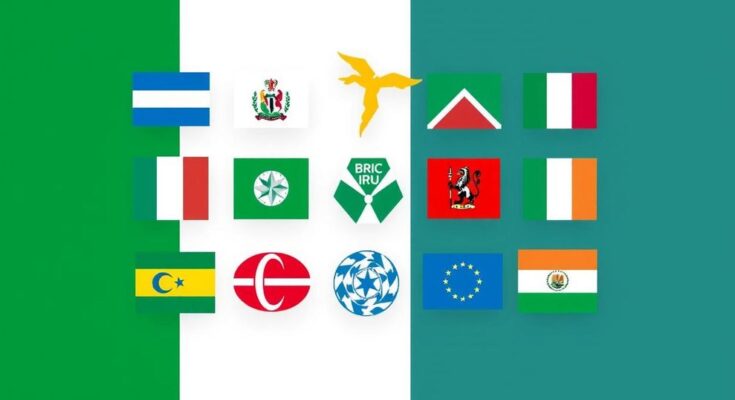At the conclusion of the BRICS summit in Russia, Nigeria and twelve other countries have joined as partner nations. Although no new full members were accepted for 2024, these countries are poised to pursue full membership in the future. BRICS, originally formed by Brazil, Russia, India, China, and later South Africa, aims to enhance economic collaboration among emerging markets.
As the BRICS summit concludes in Russia, Nigeria, along with twelve other nations, has officially joined as a partner country within the BRICS initiative. A total of thirteen new countries have been accepted as partners, with BRICS deciding against the inclusion of any new full member states for the year 2024. These thirteen nations are working towards the possibility of attaining full membership in the alliance at a future date. The list of full members of BRICS currently includes Brazil, Russia, India, China, South Africa, UAE, Iran, Egypt, Ethiopia, while the officially recognized BRICS partner countries now comprise Algeria, Belarus, Bolivia, Cuba, Indonesia, Kazakhstan, Malaysia, Nigeria, Thailand, Turkey, Uganda, Uzbekistan, and Vietnam. The inception of BRICS can be traced back to 2006 when Brazil, Russia, India, and China banded together, forming a group of significant emerging economies. The acronym “Bric” was coined by prominent economist Jim O’Neil from Goldman Sachs in 2001, predicting these nations to potentially rise as leading global economies by the year 2050. South Africa was incorporated into the alliance in 2010, thereby expanding the cooperative to what is known today as BRICS.
BRICS stands for an alliance comprising Brazil, Russia, India, China, and South Africa, which was formalized in its current form in 2010. The partnership aims to foster economic cooperation among large, emerging economies, thereby providing a counterbalance to Western dominance in global affairs. The addition of new partner countries signifies a strategic expansion of their influence and underscores the importance of collaborative economic development. Each member state aims to leverage collective resources and enhance political dialogue and trade relationships that will benefit their respective economies.
In summary, the recent acceptance of Nigeria and twelve additional countries as partner states within the BRICS framework underscores the initiative’s strategic expansion while maintaining existing membership structures for 2024. The cooperation among these nations fosters a collective effort towards significant global economic influence and development, adhering to the vision articulated by economist Jim O’Neil regarding the potential of emerging markets.
Original Source: www.bbc.com




